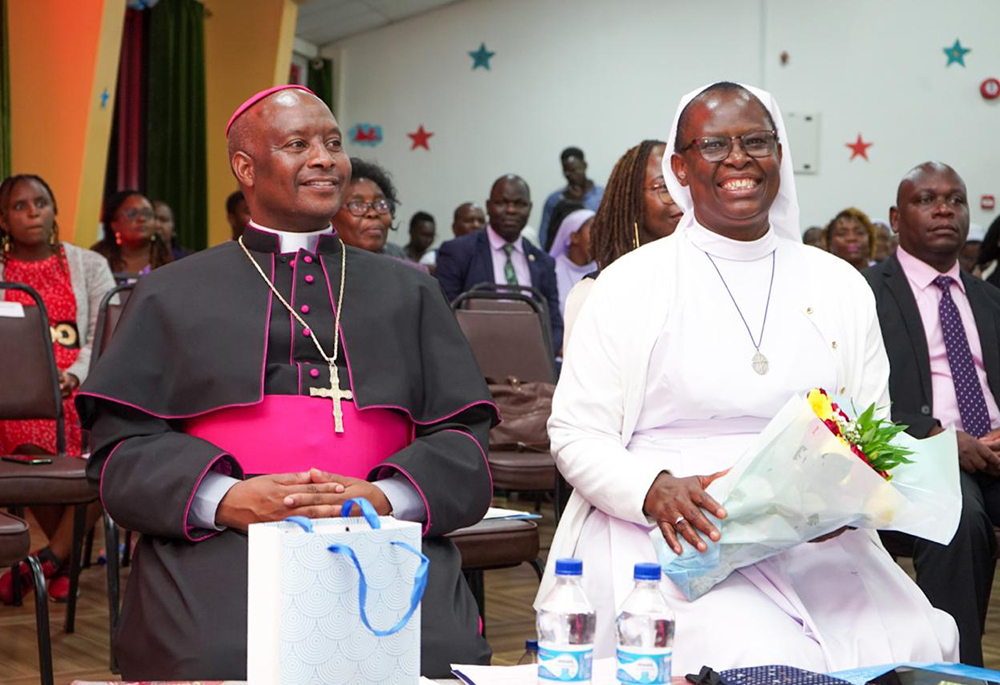
Bishop Wallace Ng'ang'a Gachihi of the Military Ordinariate of Kenya and Sr. Agnes Lucy Lando are pictured at the launch of Lando's new book on Oct. 30 at Paulines Communication Centre in Nairobi, Kenya. (Courtesy of Association for Catholic Information in Africa and FIAT Communications and Consultancy Centre, Nairobi)
At Georgetown University, the Women Faith Leaders Fellowship welcomes a cohort of African Catholic sisters each spring. Three groups host this fellowship: the Berkley Center for Religion, Peace and World Affairs; the Joint Learning Initiative on Faith and Local Communities; and the Center for Public and Nonprofit Leadership.
A new book by Sr. Agnes Lucy Lando, a member of the Missionary Institute of the Sisters of Mary of Kakamega in Nairobi, and professor of communication and media studies at Daystar University in Nairobi, Kenya, emerged from the fellowship: Moving Into Unreached Pastoral Frontiers: Making Visible the Impact of Catholic Sisters Serving in Non-Catholic Institutions (Paulines Publications Africa, 2024). The publisher and Daystar University co-hosted a book launch in Nairobi on Oct. 30, with global guests joining remotely.
Global Sisters Report met with the fellowship's principal investigator, Katherine Marshall, for some background on the 2023 cohort. GSR then spoke to Lando to learn how her fellowship experience at Georgetown led to the book.
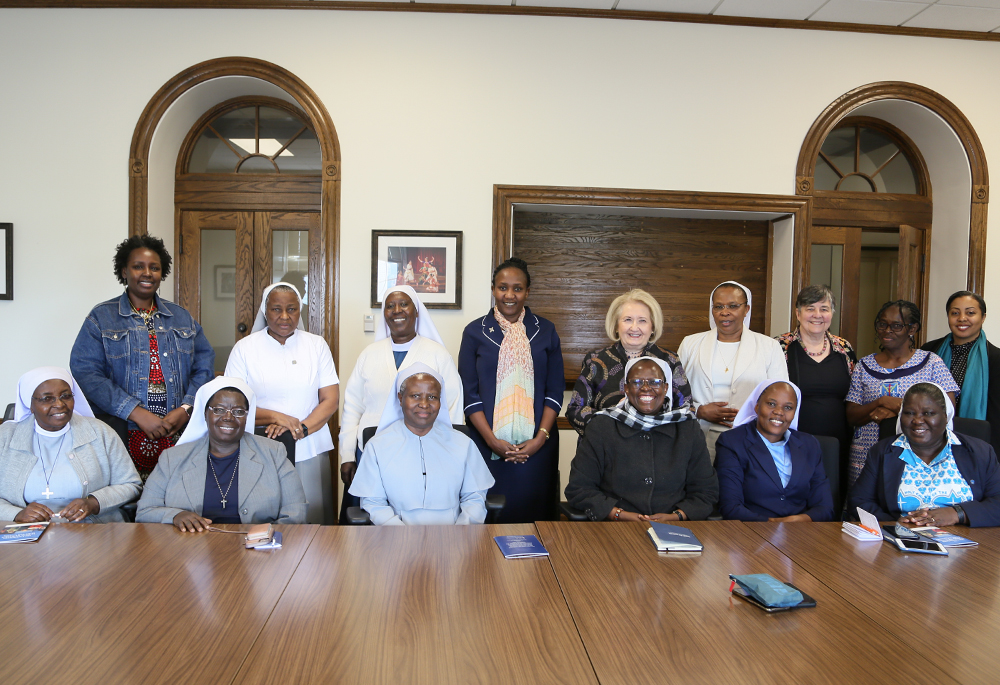
The Women Faith Leadership Fellowship, 2023-24 cohort for Georgetown University gathers for a photo. Sr. Agnes Lucy Lando is pictured in the center front, with Ambassador Melanne Verveer, executive director of the Georgetown Institute for Women, Peace and Security, behind. Third from the right in the back is Katherine Marshall of the Berkley Center. (Courtesy of Georgetown University)
GSR: What was the spark that got this fellowship rolling?
Katherine Marshall: I had been working quite closely with the Joint Learning Initiative since its inception, and knew they were working with the Conrad N. Hilton Foundation and the Bill & Melinda Gates Foundation on a pilot project on Catholic sisters and women's empowerment. (Conrad N. Hilton Foundation is a major funder of Global Sisters Report.) Those funders chose Georgetown as the best university for their purposes. Sr. Lando was part of that first cohort of sisters in 2023, and she developed her study when she was here. She asked me to write the foreword for the resulting book, which I did.
Do you feel that they're at a point in their careers where this is a natural next step?
The theme was and remains women's leadership. There's quite a range within the cohort. There are people with doctorates like Sr. Lando, who was already teaching at a university. It amounted more than anything to giving them new insights about global perspectives on issues, and new opportunities.
Advertisement
They do remarkable work that is very rarely visible for a variety of reasons. For some modesty explains much of the invisibility, not wanting to put yourself forward. However, it's also the classic and useful "cloak of invisibility," in that if you're not seen, then you often have a freedom to do things others can't do.
At the end of October 2024 we went to Nairobi to meet a new cohort of 18 sisters from Ghana and Kenya who will come to Georgetown the following spring for another two-week program. The Berkley Center for Religion, Peace and World Affairs at Georgetown University also has an archive of interviews with over 400 people, including a significant number of Catholic sisters, available on its website.
Professor Lando, what first led you to write this book?
Lando: Professor Marshall said I should choose something that I could complete within one year. I thought of my way of life, apostolate and service at the university. And I realized that, yes, I do something in non-Catholic institutions, and I've known a few other sisters who do, but we are invisible. That's how I settled on it.
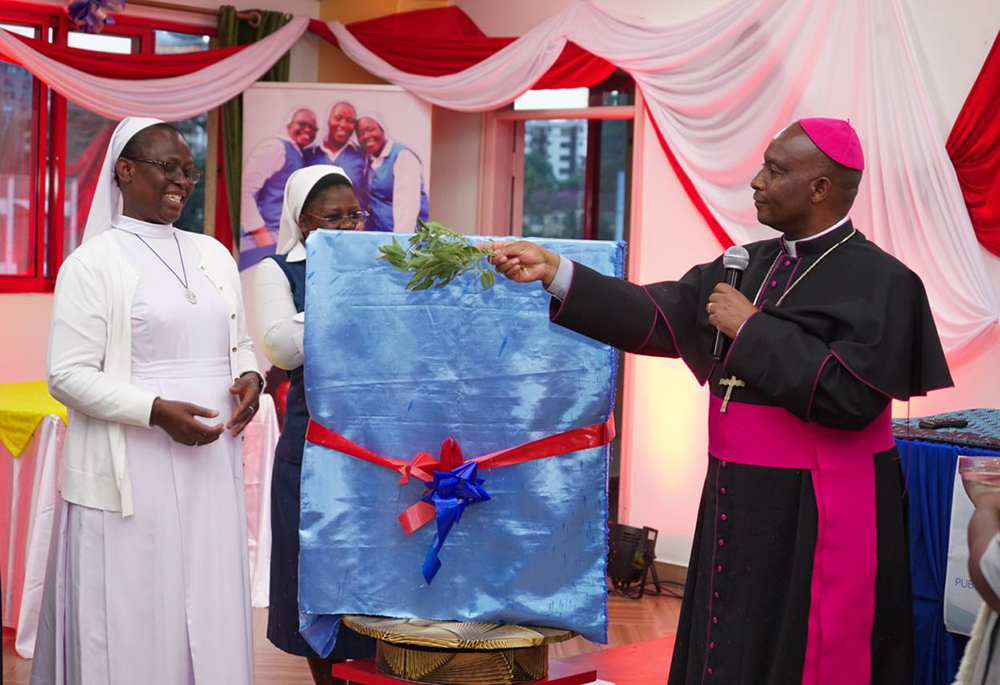
Sr. Agnes Lucy Lando and Bishop Wallace Ng'ang'a Gachihi of the Military Ordinariate of Kenya unveil the cover of her new book Moving Into Unreached Pastoral Frontiers on Oct. 30 at Paulines Communication Centre in Nairobi. (Courtesy of Association for Catholic Information in Africa and FIAT Communications and Consultancy Centre, Nairobi)
Please describe your data collection.
I used both qualitative and quantitative research methodologies. I began by sending out questionnaires through the ACWECA [Association of Consecrated Women in Eastern and Central Africa], which is based here in Nairobi, and where Sr. Bridgita Samba Mwawasi (Sisters of St. Joseph of Mombasa, Kenya) is the secretary general.
From my findings, we see that there are many Catholic sisters serving non-Catholic institutions and facing the same challenges I do. But our contribution is invisible because we don't have a forum to say that this is what we are doing.
Tell us more about your relationship with Daystar University, where you work.
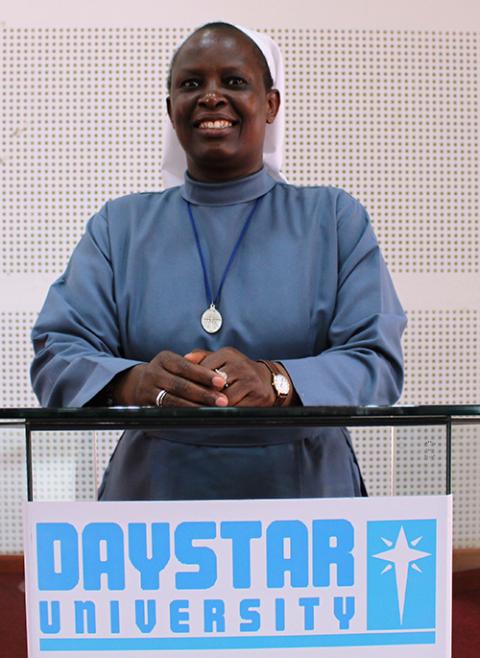
Sr. Agnes Lucy Lando is pictured with the Daystar University logo (Courtesy of Agnes Lucy Lando)
Daystar [is self-described] as "a Christ-centered institution of higher learning which exists to equip students with servant leadership knowledge and skills for the transformation of church and society." We define ourselves as non-denominational, with Baptist and Pentecostal influences. I earned my first degree there in communication and audiovisual productions with an English minor in 1999. Then I worked for the Association of Member Episcopal Conferences of Eastern Africa, AMECEA, as a communication secretary for the Catholic bishops' regional conference. I coordinated communication in eight countries of Eastern Africa, now they have moved to about 10.
Then I returned to Daystar for a master's degree in cross-cultural Christian communication, before working for Maryknoll missions under Fr. Dick Quinn, whose grave I was later privileged to visit in Maryknoll, New York. I worked for him at Ukweli Video Productions in the Archdiocese of Nairobi as a video director and producer, graduated in 2002, and then continued working from 2003 to 2005. Later I went to Rome for my doctoral studies. [Editor's note: In Rome, she earned her doctorate magna cum laude in social sciences from the Pontifical Gregorian University.]

In February 2022, Sr. Agnes Lucy Lando became the first female full professor of Daystar University. (Courtesy of Agnes Lucy Lando)
For my doctorate I conducted field research in Kenya, Uganda and Tanzania. In Kenya, the vice chancellor of Daystar, Godfrey Nguru, said, "You are our daughter, why don't you apply to come and work with us?" I had to wait for an advert, apply, and go through the process like everyone else, in 2008. … Daystar is very strong on integration of faith and learning. It has taken me 16 years to become a full professor.
In your book, when you asked, "Why do Catholic sisters serve in non-Catholic institutions?" you said you find the answer in Lumen Gentium, that "the Roman Catholic Church, a pilgrim church in nature, has a missionary mandate on earth." Do you feel that mandate? How do you embrace Lumen Gentium?
I feel the missionary life in me every single day, every single moment. I am very cautious all the time that I am, number one, a Christian, a follower of Christ, a Catholic; and number two, that I'm a religious. These two things move with me wherever I go.
As a Christian, I have been commissioned to go out and serve humanity by Christ. As a religious, I'm called to do more, to avail myself more and to serve. And as I quote in Lumen Gentium and also the great commission of Matthew 28, we are boundaryless. We are supposed to serve man and woman and the youth wherever we are missioned, without setting boundaries. I find myself in a non-Catholic institution because it is a place the good Lord wants me to go and serve, and I was missioned there by my lawful superiors.
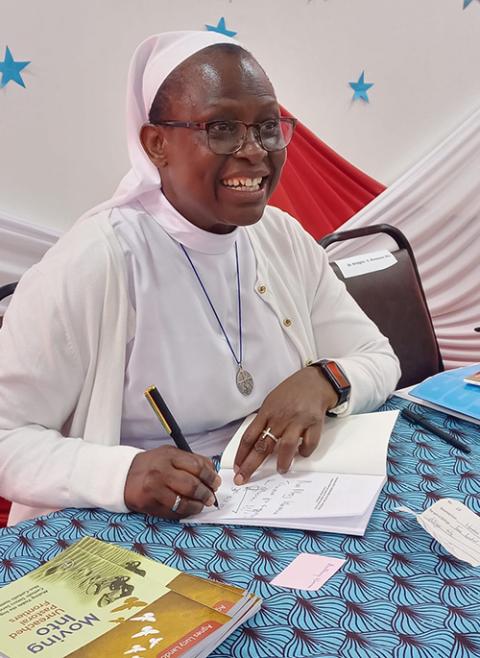
Sr. Agnes Lucy Lando, at the launch of her new book on Oct. 30 at Paulines Communication Centre in Nairobi (Courtesy of Association for Catholic Information in Africa and FIAT Communications and Consultancy Centre, Nairobi)
So you're living, then, a model of how people, Christians, can work together. It seems to me you're living something prophetic, in a way.
By the grace of God, yes. The vice chancellor who hired me is not Catholic. He did something unprecedented. I am the first and only Catholic sister so far serving in this university, hired by that one professor. Also, Katherine Marshall is not Catholic, but she inspired this research.
Do you feel that Catholic sisters ought to keep working in non-Catholic institutions?
I was doing an interview with some people from the Democratic Republic of Congo. There has been a very long war in the Goma region, where we have the minerals. All sorts of armies are there, all sorts of religious groups and NGOs are there. I was asking the people, "What makes you stay in this place that is very difficult?"
And they told me, "The sisters, the Catholic sisters."
So I asked, "Why?"
They said, "Because sometimes when life here is unbearable and the tensions are high and lives are being lost many people close shop and move, even some different groups of armies take cover. However, the Catholic sisters remain, and they give us social services, they give us education, they give us medical support, they give us hope. Because of them, we are strong. We are here to stay because they are staying."
The sisters bring hope, even in places where maybe people are giving up hope, or it's a place that is considered, "Don't go there." We are in places where the government is not. We are in places where there are just two or three of you.





